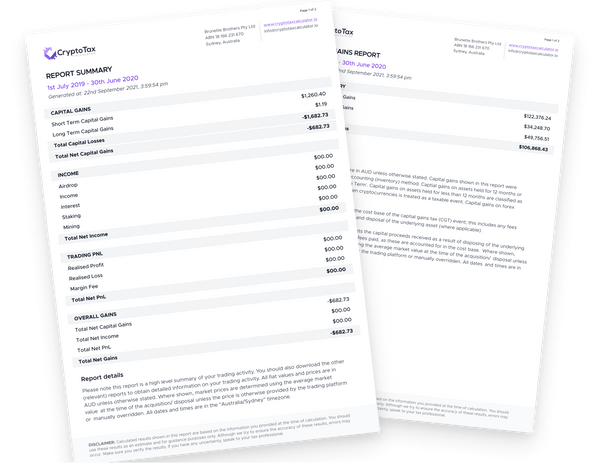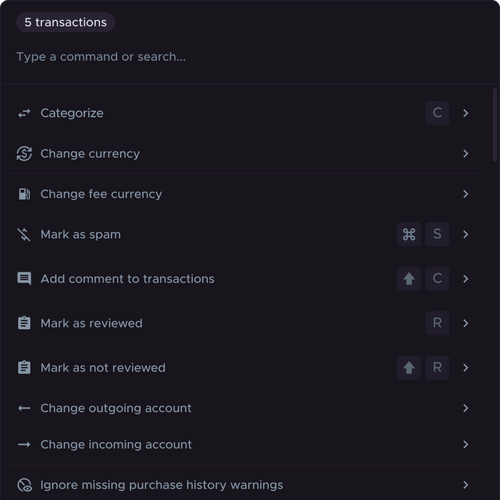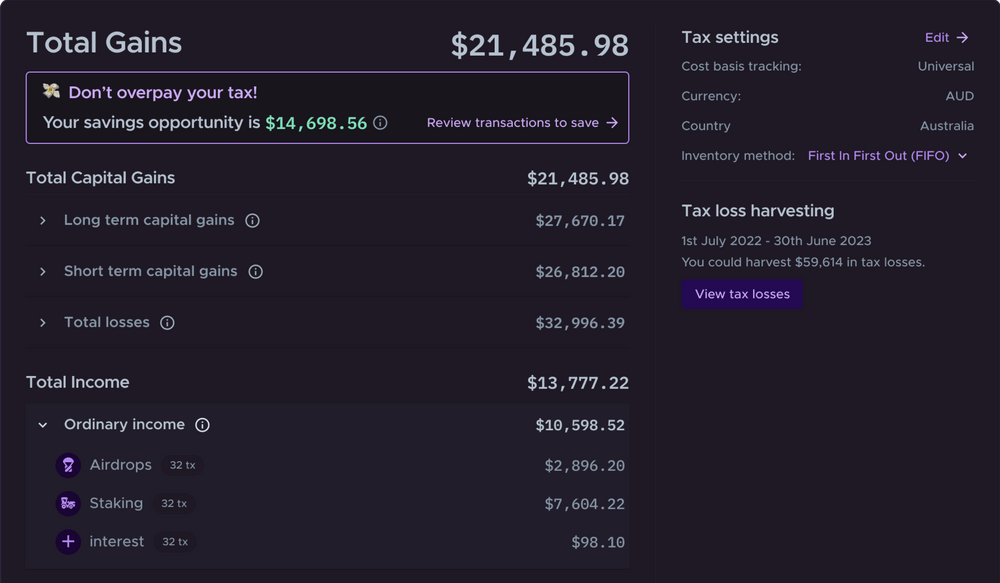
Accurate crypto taxes. No guesswork.
Accountant-endorsed tax reports.
Follows CRA tax guidelines
TurboTax
4.8/5 TrustPilot
Built to support CRA Tax Guidelines
Full support for the unique CRA reporting requirements, including Canada-specific rules around personal use, mining, staking and airdrops. Adjusted Cost Basis (ACB) and the Superficial Tax Loss rule are also supported.

Supports complex activity
Trading on the wild side of crypto? Your activity is supported, no matter how far you’ve fallen down the rabbit hole.

Be confident in the numbers
Easily see what's going on across all your wallets and exchanges so you can make the best decisions at all times.

Make compliance a breeze
Fully automated from start to finish. Seamlessly import all your transactions, follow the automated workflow and get your audit-proof tax reports with ease.
No credit card required
Official Partners
Backed by Coinbase Ventures, we’re proud to offer best-in-class support for the Coinbase ecosystem.
Learn more
We're thrilled to partner with MetaMask, the leading self-custodial wallet, to make crypto taxes a breeze.
Learn more
5-Star Support
Our team genuinely care about helping you do your crypto tax. Get real help from real people whenever you need it.
Tailored Support ForNFTsDeFi ProtocolsExchangesBlockchains
Fallen down the crypto rabbit hole? Don’t waste hours scouring block explorers and drowning in spreadsheets—import transactions automatically from over 1000 sources.
Find your integrations

Every Tax Report You Need
No need to try and explain your degen trades, just give your accountant the reports.

TurboTax PDF
Capital gains
Income
Expenses
Audit report
+8 other detailed reports
Start with a free account
Learn
Helpful guides to understand the numbers and breeze through tax season.

Canada Tax Guide
Unsure about your crypto tax obligations? This comprehensive guide helps you understand and file your crypto taxes in Canada.
Learn about CA crypto taxes
DeFi Tax Guide
Have you been dabbling with DeFi? This in-depth guide breaks down the details of DeFi taxes so you can file with confidence.
Learn about DeFi taxes
NFT Tax Guide
Tried your hand at NFT trading? This complete guide that breaks down the details of NFT taxes so you can file with confidence.
Learn about NFT taxesAll in one portfolio tracker
Track your entire portfolio, PnL and tax liability all in the same place.
portfolio value:
$89,436.20
Built for speed
Optimized interface for bulk operations with keyboard shortcuts.



Automatically identified tax saving opportunity
All your transactions clearly grouped by their tax impact with your potential savings opportunity highlighted.

Full tax calculation transparency
See the exact breakdown of how each transaction is calculated. Understand the `why` and `how` behind your tax figures.

Altcoin pricing oracle
300k+ currencies priced accurately on import. Historical prices for all micro-cap memecoins.
Complete DeFi support
Unified tracking and tax reporting for all your crypto assets across all your exchanges and wallets.

No credit card required
Use What The Pros Use

Called my tax accountant to warn him there will be some crypto and NFT stuff this year. His reply wasn’t what I expected: “No worries, know all about them! My 13 yo daughter creates NFTs and sells them on OpenSea. And we use @CryptoTaxHQ for our clients” Boom! I chose well💥💥

Not sponsored or anything but came across CryptoTaxCalculator.io @CryptoTaxHQ. Such an easy way to track and record your crypto taxes automatically. Made tracking my Binance spot/futures trades + Uniswap transactions a whole lot less daunting.

Best Crypto tax Software? after importing data onto @koinly @CryptoTaxHQ and @ZenLedgerIO the clear winner had the best UI Crypto Tax Calculator is the winner - detailed thread tomorrow

CTC has a really good Reconcilliation section where it flags up issues and presents them in logical order so you can tick them off one by one. It's still work but it's just more intuitive I found

Just did my crypto taxes with @CryptoTaxHQ and got my report summary. Overall, very pleased with the process! Highly recommend if you have not yet decided on what crypto software to use. Did my taxes in a few hours and going to my tax guy tomorrow.

I’ve used a few but the best I found was https://cryptotaxcalculator.io . I’m in UK (I think they’re in Aus) so YMMV. GL

Unlike other tax items where you have to wait for 1099s' or bank statements, you can code all of your Crypto and Defi as soon as the ball drops on new years and get a good estimate of where your taxes lie. @CryptoTaxHQ is still my first recommendation for tools.

2021/2022 taxes completed and paid. Use your bear market time wisely. Big shoutout to @CryptoTaxHQ, second year running I've used them. I've tried a few of these calculators and CTC blow their competitors out the water.

A cryptid is tentatively back from hiatus but will be keeping update frequency low rn. Uncle Sam unretired me 4 a mission to JPN so had to finish taxes early. Got it done thx to #CryptoTaxCalculator (@CryptoTaxHQ). I have no affiliation w/ them. Pls just keep it alive🙏

@CryptoTaxHQ I literally could not function without ctc. I've got multiple assets on multiple blockchains doing 5-10k transactions a year. Doing that by hand would be pure insanity.

Called my tax accountant to warn him there will be some crypto and NFT stuff this year. His reply wasn’t what I expected: “No worries, know all about them! My 13 yo daughter creates NFTs and sells them on OpenSea. And we use @CryptoTaxHQ for our clients” Boom! I chose well💥💥

Not sponsored or anything but came across CryptoTaxCalculator.io @CryptoTaxHQ. Such an easy way to track and record your crypto taxes automatically. Made tracking my Binance spot/futures trades + Uniswap transactions a whole lot less daunting.
Trusted By Accountants
Our platform has been developed in deep collaboration with accountants and tax lawyers.
“Crypto Tax Calculator does the job spectacularly”
We’ve been looking for a product to help us manage our clients’ crypto tax returns, and Crypto Tax Calculator does the job spectacularly. Not only does the team keeps on top of all HMRC changes so we can have full confidence in the reports we produce, but their product is an efficient way to bring in a client’s data from a constantly growing multitude of exchanges, blockchains, and wallets. Couldn’t ask for anything better.

Joe David
Founder, Myna Accountants
“Crypto Tax Calculator’s software enables our team to tackle the most complex DeFi scenarios.”
...from liquidity protocols, to NFT ecosystems, and remain at the forefront of crypto tax reconciliation. As specialists in cryptocurrency reporting, accuracy is completely essential to us, our clients and our accounting partners, which is why we love CTC.

Oliver Woodbridge
Director, Tax On Chain
“Crypto Tax Calculator is a tool we couldn’t live without.”
As an accounting firm that specialises in crypto taxes, Crypto Tax Calculator is a tool we couldn’t live without. Being able to aggregate client’s transactions across all exchanges and blockchains into one data feed brings incredible efficiencies to the crypto tax compliance process.

Marc Phillis
Director, Cryptocate
“The most advanced and accurate crypto tax calculator on the market”
“The most advanced and accurate crypto tax calculator on the market”

Harrison Dell
Tax Lawyer & Web 3 Founder - Cadena Legal
Frequently Asked Questions
At CTC, we design our product with security in mind. We follow industry standard best practices to keep your data safe.
How does the CRA treat cryptocurrency for tax purposes?
The Canada Revenue Agency (CRA) views cryptocurrency as a commodity, similar to a precious metal like gold. This means it's not considered legal tender like the Canadian dollar. How your cryptocurrency transactions are taxed depends on why you're using it. If you occasionally buy and sell cryptocurrency for investment purposes, any profits or losses are generally considered capital gains or losses. On the other hand, if your activities are more frequent, involve mining or staking, or are done with a profit motive, your cryptocurrency transactions may be considered business income or losses. The CRA requires you to report all taxable cryptocurrency transactions. This includes selling cryptocurrency for Canadian dollars or another cryptocurrency, using cryptocurrency to buy goods or services, receiving cryptocurrency as payment, and earning cryptocurrency from mining or staking. Failing to report these transactions can result in penalties or audits.
Do I have to pay tax on cryptocurrency in Canada?
Yes, you may have to pay tax on your cryptocurrency transactions in Canada. You are required to pay taxes when your cryptocurrency activities result in capital gains, capital losses, or income. This includes selling cryptocurrency for Canadian dollars, trading one cryptocurrency for another, using cryptocurrency to pay for goods or services, and receiving cryptocurrency through mining, staking, or as payment. The CRA expects you to report all such transactions on your tax return. Depending on the frequency and intention of your crypto activity, it may be taxed as either capital gains or business income.
Is cryptocurrency considered a taxable commodity in Canada?
Yes, the CRA classifies cryptocurrency as a taxable commodity, not legal currency. This means that any transaction involving cryptocurrency is subject to the same tax rules as other commodities and barter transactions. For example, when you sell cryptocurrency for Canadian dollars, it triggers a capital gain or loss. When you use cryptocurrency to buy something, the CRA considers it a barter transaction where you traded one commodity (cryptocurrency) for another (the goods or services).
How are capital gains from cryptocurrency taxed in Canada?
You realize a capital gain when you dispose of your cryptocurrency. This includes selling it, trading it for another cryptocurrency, or using it to buy goods or services. Only 50% of your capital gain is included in your taxable income. You need to calculate your adjusted cost base (ACB) for each cryptocurrency you hold. This is essentially your average cost of acquiring the cryptocurrency, including transaction fees. You can use capital losses to offset capital gains in the same tax year. You can also carry losses back to previous years or forward to future years.
How do I calculate my capital gains on cryptocurrency in Canada?
To calculate your capital gain or loss, you need to determine your adjusted cost base (ACB) and your proceeds of disposition. Your ACB includes the original purchase price of your cryptocurrency (in Canadian dollars) plus any associated fees. If you've bought the same cryptocurrency multiple times, you'll need to calculate the weighted average cost. The proceeds of disposition is the value of the cryptocurrency in Canadian dollars at the time you sell, trade, or use it. To calculate your capital gain/loss, subtract the adjusted cost base from the proceeds of disposition. It's important to remember the superficial loss rule: If you sell a cryptocurrency and buy back the same one (or a substantially identical one) within 30 days, you cannot claim the capital loss. Also, all amounts must be reported in Canadian dollars on your tax return.
Do I have to report cryptocurrency received as income in Canada?
Yes, if you receive cryptocurrency as income, it's taxable. This includes cryptocurrency earned from mining, staking, and as payment for goods or services. The CRA generally considers this income from property. The taxable amount is the fair market value (FMV) of the cryptocurrency in Canadian dollars at the time you receive it. This income is subject to the same tax rules as income earned in cash and must be reported on your T1 General Tax Return.
What are the tax rules for cryptocurrency staking in Canada?
Staking rewards are generally considered income from property by the CRA. You need to include the fair market value (FMV) of the rewards in Canadian dollars at the time you receive them in your taxable income. When you eventually sell or dispose of the staked cryptocurrency, any gains or losses are subject to capital gains tax, calculated as explained earlier. It's crucial to keep detailed records of your staking activities, including the date and amount of staking rewards earned and the FMV of the rewards in Canadian dollars at the time of receipt.
What are the tax implications for crypto-to-crypto trades in Canada?
The CRA considers crypto-to-crypto trades as dispositions. This means each trade triggers a capital gain or loss, even though you haven't received any Canadian dollars. To calculate the gain or loss, determine the adjusted cost base of the cryptocurrency you're disposing of and calculate the proceeds of disposition using the fair market value (in Canadian dollars) of the cryptocurrency you're acquiring.
Do I need to pay GST/HST on cryptocurrency transactions?
GST/HST may apply to cryptocurrency transactions in certain situations. If your business accepts cryptocurrency as payment for goods or services, you need to charge GST/HST. The tax is calculated on the fair market value of the cryptocurrency at the time of the transaction. Since the CRA treats crypto as a commodity, accepting it as payment is considered a barter transaction. Both parties involved in the barter may need to account for GST/HST. GST/HST generally doesn't apply to personal cryptocurrency transactions unless your activities are considered a business.
How do I report cryptocurrency transactions to the CRA?
You need to report your cryptocurrency transactions on your income tax return. Use Schedule 3 to report capital gains and losses from disposing of cryptocurrency. Use Form T2125 to report business income from cryptocurrency activities like mining or frequent trading. The CRA requires detailed records of your transactions. Make sure to keep track of the dates of transactions, type of transaction (buy, sell, trade, gift, etc.), Canadian dollar value of each transaction, transaction fees, and the calculation of your adjusted cost base (ACB).
What happens if I fail to report cryptocurrency on my taxes in Canada?
Failing to report your cryptocurrency transactions can have serious consequences. The CRA can impose penalties and charge daily compound interest on any unpaid taxes. You may be subject to a tax audit, and in severe cases, you could face criminal charges. If you realize you made a mistake or omission on your tax return, you can correct it through the CRA's Voluntary Disclosures Program. This allows you to come forward and disclose the information before the CRA starts an audit. It's always best to be proactive and report all your cryptocurrency activity accurately and on time.
How does the free trial work?
The platform is free to use immediately upon signup, allowing you to import your transactions and take advantage of our smart suggestion and auto-categorization engine, portfolio tracking, DeFi and NFT support. For access to reports, the tax loss harvest tool or chat and priority support, you will need to upgrade to the appropriate paid plan.
Get started for free
Import your transactions and generate a free report preview
No credit card required




































